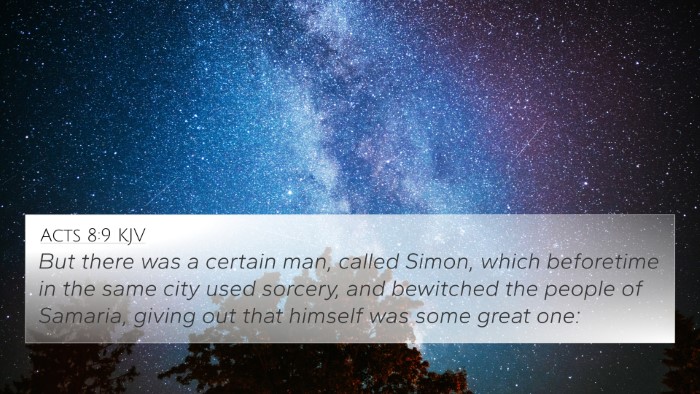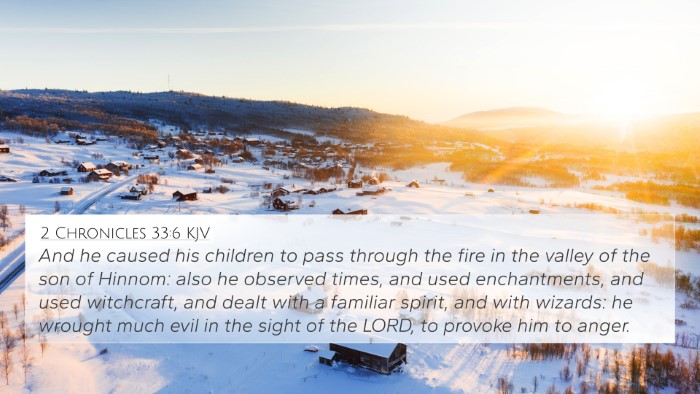Understanding Galatians 5:20
Galatians 5:20 speaks about the works of the flesh, particularly naming key transgressions that stand in contrast to the fruits of the Spirit. This verse serves as a warning against moral failings that can arise when one forsakes the guidance of the Holy Spirit.
Verse Text
“Idolatry, witchcraft, hatred, variance, emulations, wrath, strife, seditions, heresies,”
Commentary Insights
This verse highlights several vices that exemplify a life devoid of the Spirit's influence. The following insights compile interpretations from prominent public domain commentaries:
-
Matthew Henry's Commentary:
Henry notes that these works of the flesh represent a rebellion against God's righteousness. Idolatry, for instance, shows a turn away from God to created things, demonstrating an essential brokenness in the relationship between humanity and the divine.
-
Albert Barnes' Notes:
Barnes identifies that "witchcraft" in this context can imply practices that are contrary to faith and reliance on God, reflecting a dependence on sinister forces rather than divine providence. He further emphasizes that each act listed represents a refusal to submit to God’s authority.
-
Adam Clarke's Commentary:
Clarke elaborates on the social implications of these sins, noting that they often result in conflict and division within communities and relationships. He stresses the need for believers to exhibit love and unity, countering the strife detailed in this verse.
Cross References
This verse is interconnected with the following biblical passages, showcasing the thematic links as to how various scriptures address similar behaviors and attitudes:
- Exodus 20:3-6: God’s command against idolatry and the emphasis on exclusive worship.
- Galatians 5:19-21: Contextual verses that provide a more comprehensive list of the works of the flesh, reinforcing Paul’s warnings.
- Romans 1:21-32: A vivid description of humanity's detachment from the knowledge of God leading to various sinful expressions.
- Ephesians 4:31: An encouragement to rid oneself of bitterness and wrath, directly addressing several behaviors listed in Galatians 5:20.
- James 3:14-16: A considerate introduction to strife and the earthly wisdom that breeds confusion and every evil work.
- 1 Corinthians 3:3: Paul highlights the factions and strife in the church, paralleling the divisions noted in Galatians.
- Revelation 21:8: A sober reminder of the ultimate fate of those engaging in the mentioned sins, emphasizing a call to repentance.
Thematic Connections
The thematical relationship among these verses showcases a broader biblical narrative that calls believers away from lives marked by these vices, urging instead for a commitment to holiness, love, and community. The absence of the Spirit yields works of the flesh that echo the chaos of a world apart from God.
Application for Believers
This verse serves as both a warning and a challenge for modern Christians. The emphasis on avoiding these works of the flesh necessitates personal introspection and a reliance on the transformative power of the Holy Spirit. Believers are called to:
- Examine personal lives for signs of the works of the flesh.
- Seek continuous spiritual renewal through prayer and scripture.
- Foster community that reflects love, understanding, and unity.
Conclusion
Galatians 5:20 encapsulates a critical warning against behaviors that disrupt one’s relationship with God and fellow believers. By engaging in a thorough comparative analysis of relevant scriptures, Christians can cultivate a deeper understanding of the dynamics between faith and moral living.
SEO Keywords Analysis
Utilizing targeted keywords such as "Bible verse cross-references" and "thematic Bible verse connections" can effectively guide seekers through the complex web of scriptural teachings. Believers looking for "how to find cross-references in the Bible" will find enriched understanding through these connections.
Further Exploration
For deeper study, consider utilizing tools such as a bible concordance or a bible cross-reference guide. These resources assist in identifying connections between Old and New Testament teachings, enabling a comprehensive outlook on the significant themes present in the scriptures.














